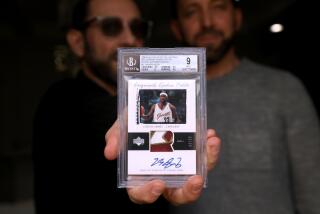Ship of Fools Bought Anglers’ Act
OK, it sounded like a good idea: Take my son, who’s only visiting here for a month, on our first ocean fishing trip.
Fishing is about the only thing this old fogy and his teen-age son generally agree on. When he was only 5, we had fished without poles for bluegill in Arizona. Back then, he liked the part best where we dug our own worms. I taught him everything I knew about angling--not much--and he quickly surpassed me in knowledge and enthusiasm. A few years later, he became my instructor as we tried to land trout and small-mouth bass in the Sierra.
So what if the half-day trip for two out of San Diego would spit back only chump change from the four $20 bills I had stuffed in my wallet that morning? Ditto for the 6:30 a.m. castoff that necessitated a 5:15 wake-up call. This was a chance to communicate, inhale some fresh salt air and, maybe, even catch dinner.
As it turned out, our biggest catch was a rather intriguing scam run by the boat’s crew.
As the morning unfolded, I alternately reveled in and cursed the four years I’d spent in Nevada. Pleased that I’d finally caught on to the game, I was irritated that it had taken me so long to figure it out. After four years in the shake-’n’-bake capital of Western civilization, I should be able to quickly pick out a stacked deck or the “shills” in any game of chance, be it seven-card stud or “cattle boats.”
The galley sign that offered fresh sea bass--after 10 a.m. and for $7-plus a pound--should have been the first clue. If not that, then at least the fact that clearly two-thirds of the bass taken in the first two hours came from a back corner of the boat--caught by a trio of guys who were on a first-name basis with the crew. Regulars, I surmised.
And, silly me, I bought into the skipper’s announcement that we would be rotating by number to the back of boat so everyone would have a fair chance at the best spots. I even thought the early complaints to the crew from a couple of disgruntled fishermen were out of line, even if a deckhand had responded with a smart, degrading remark. After all, our group of four (a brother-in-law and nephew went too) had hooked a 10-inch mackerel and a couple of baby sculpin in the first 15 minutes; undoubtedly, our luck would improve with time.
It wasn’t until I took a cigarette break at about 10 that I finally figured out that the game was being played with loaded dice. The third of four rotations had just begun, and I noticed that the “lucky” fishermen had never moved from the back corner they had occupied since we first anchored. Still ignorant and figuring I might pick up some tips, I decided to watch closely just what they were doing.
For one thing, they just happened to be standing in the area where the “chummer” (that’s the guy who throws bait fish over the back to attract other fish) was tossing six nets of anchovies for every one he threw to the other side. Better yet, the chummer was only putting the biggest bait fish in the live-well when these lucky guys came to the tank.
Later in the morning, when it was our turn at the back, we moved to the lucky corner. In the next 45 minutes, standing alongside the permanent fixtures, my brother-in-law and I landed three bass--our only keepers--and hooked at least that many more. (By then, the teen-age boys had pretty much given up.) It was fun and almost made the trip worthwhile. That sentiment, though, probably was not shared by half the folks on the boat who got nothing worth keeping for their money and time.
And for some of us, the ill will was compounded when, on the trip back to the marina, the lucky fishermen helped the deckhands clean the boat--like they worked there or something.
I have since learned from more-seasoned co-workers that our experience was not unique on some cattle boats up and down the coast. Such games, they say, are just one of reasons few people except tourists bother with them on summer weekends.
Some say the lucky fishermen, called “deadheads,” are on the boats just to show the paying customers that fish can be caught. Others say the deadheads sell the fish they catch to unlucky passengers or restaurants. Another theory, which would dovetail with the big bait fish routine, relates to the “pool” many boats run: The money in the pot goes to the person who catches the biggest fish.
(If the latter was the case on our boat, the deadheads were waylaid by a suicidal cod. A paying customer--a guy with his family--walked away with the 50 or so dollars when the 10- to 12-pound cod partially swallowed a small bass the man had caught and was already reeling in.)
Regardless, the fast shuffle these guys ran most certainly had to do with money. Damn, I felt as if I was back in Nevada.
My son and nephew were disappointed; my brother-in-law and I had a somewhat different outlook.
After 30 or 40 years of fishing, we’re used to getting skunked or not catching many.
But we’d much rather fish from a boat on an even keel.
More to Read
Sign up for The Wild
We’ll help you find the best places to hike, bike and run, as well as the perfect silent spots for meditation and yoga.
You may occasionally receive promotional content from the Los Angeles Times.






